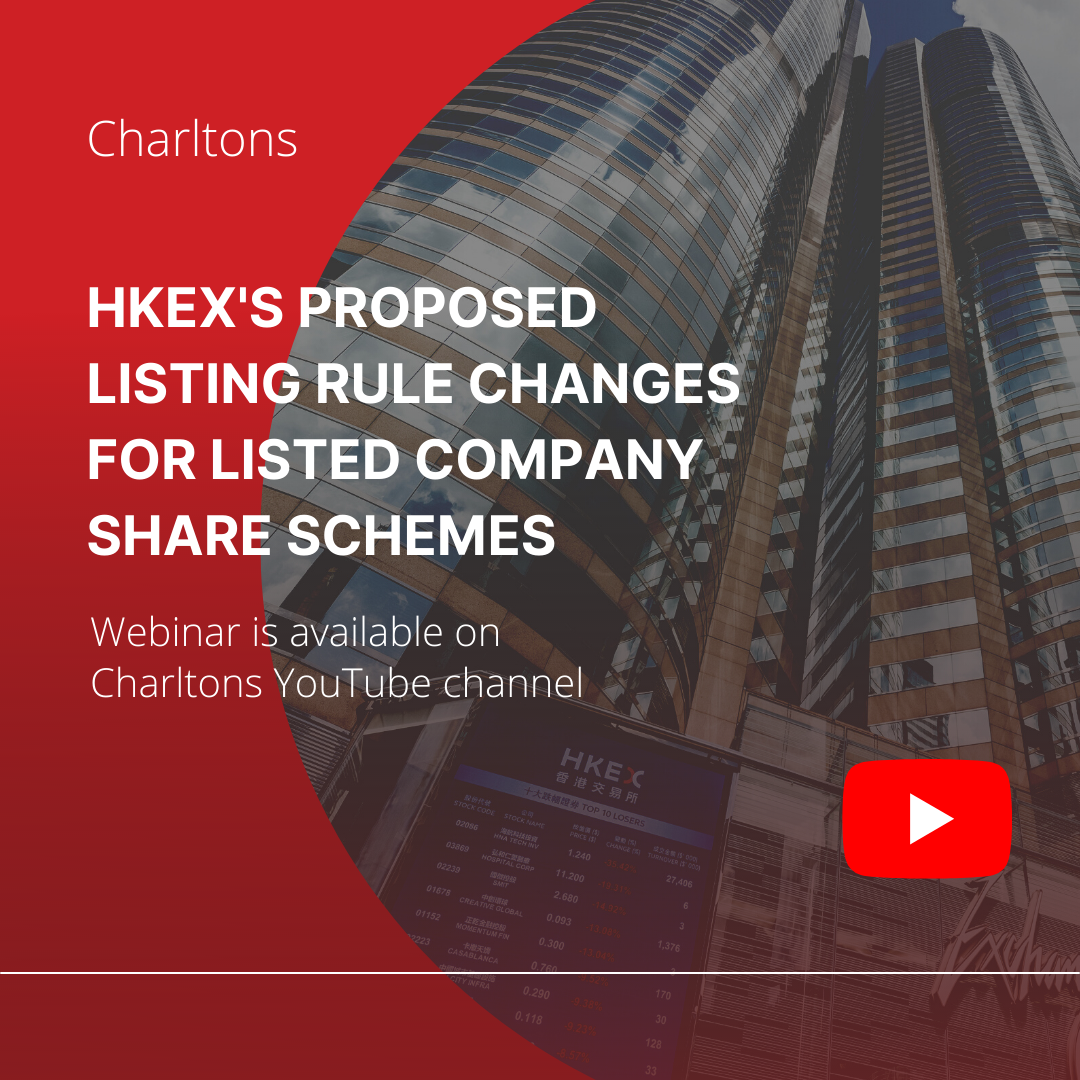Warning: Undefined variable $post in /var/www/charltons-en/wp-content/themes/divi-charltons-v4/functions.php on line 503
On 28 October 2021, Julia Charlton presented a webinar on the HKEX’s consultation paper on Special Acquisition Companies (SPACs)
On 28 October 2021, Julia Charlton presented a webinar on the HKEX’s consultation paper on Special Acquisition Companies (SPACs). The webinar covered:
- an overview of the HKEX SPAC consultation paper;
- the proposed conditions to list SPACs in Hong Kong;
- potential benefits identified by the HKEX of listing SPACs in Hong Kong; and
- the areas of concern that have been identified by the HKEX in relation to listing SPACs in Hong Kong.
A recording of the webinar is now available here.
The HKEX Consultation Paper on SPACs
Overview
De-SPAC Target
- A private company with business operations that is the target company of the De-SPAC Transaction.
De-SPAC Transaction
- This is a business combination between the SPAC and a De-SPAC Target that if successful, results in the listing of a Successor Company.
Successor Company
- This is the listed company that results from the succesful De-SPAC Transaction.
Overview – SPAC Promoters
- SPAC Promoters – the ‘deal maker’ who is tasked with identifying a suitable De-SPAC Target, negotiating the terms of the De-SPAC Transaction and seeing to the successful completion of the De-SPAC Transaction.
Potential benefits to listing SPACs in Hong Kong
- Competitive advantage
- 25 SPACs listed in the U.S. which are headquartered in Greater China
- Geographical location of Hong Kong
- Greater China targets – Hong Kong may be preferable to the U.S.
The HKEX’S concerns
- Prevention of listing shell (or cash) companies
- Quality of management
- Continuity of management
- Valuation of the SPAC
PROPOSED LISTING REGIME
Conditions for listing – investor suitability and trading arrangements
- Professional investor restrictions – trading of SPAC securities prior to the De-Transaction will be limited to professional investors only.
- Intermediaries will be required to implement certain measures to ensure compliance with the professional investor restrictions.
Trading arrangements
- Option 1 – manual trading of SPAC Warrants.
- Option 2 – allows both automatching of orders and manual trading.
Conditions for listing – open market requirements
Open market requirements:
- SPACs must distribute SPAC Shares & Warrants to a minimum of 75 professional investors (30 must be institutional investors);
- SPACs must distribute at least 75% of each of SPAC Shares and SPAC Warrants to institutional professional investors;
- not more than 50% of securities in public hands at the time of the SPAC’s listing can be beneficially owned by the 3 largest public shareholders; and
- at least 25% of a SPAC’s total number of issued SPAC Shares and at least 25% of its SPAC Warrants must be held by the public (these requirements apply on an ongoing basis).
Conditions for listing – fund raising size and warrants
Fund raising size
- Minimum fund raising size of HK$1 billion
SPAC Warrants
- Chapter 15 and Practice Note 4 of the HKEX Listing Rules to apply with certain modifications
SPAC Promoters and Directors
A majority of the SPAC Directors must be officers (as defined in the SFO) of the SPAC Promoter
HKEX to be satisfied as to the character, experience and integrity of each SPAC Promoter
At least one SPAC Promoter must a be firm that holds a Type 6 and/or Type 9 license and beneficially holds at least 10% of the Promoter Shares
SPAC Directors must among other things meet the current requirements for directors under the HKEX Listing Rules
Ongoing obligations – funds held in trust and the custodian/trustee
- Funds held in trust – it is proposed that 100% of the gross proceeds from the IPO be held in a trust account located in Hong Kong.
- Funds to be held in cash or cash equivalents.
- Trustee/custodian – must meet the requirements and obligations set out in Chapter 4 of the UT Code.
Ongoing obligations -promoter shares & warrants and trading halts & suspensions
Promoter Shares and Warrants
- Promoters will purchase SPAC Shares and SPAC Warrants
- SPAC Shares and SPAC Warrants will be subject to transfer restrictions
Trading halts and suspension
- The HKEX proposes to apply the current trading halt and suspension policy to SPACs
De-SPAC Transaction – the Successor Company
- The HKEX proposes to consider the Successor Company in the same manner as it does a reverse takeover (i.e. a deemed new listing)
- Sponsor due diligence requirements among others will apply
- The Successor Company will need to meet all of the listing requirements under the HKEX Listing Rules
- The De-SPAC Target will not be required to separately meet the financial eligibility tests
De-SPAC Transaction – IPO Sponsor appointment and listing document
IPO sponsor appointment
- The Successor Company must formally appoint an IPO sponsor at least two months prior to listing
- IPO sponsor to carry out due diligence
Listing document and approval
- Compliance with Chapter 9 of the HKEX Listing Rules required
- Listing approval required for the Successor Company prior to completion of the De-SPAC Transaction
De-SPAC Transaction – third party investment and the De-SPAC Target
Independent third party investment
Proposed that funds raised by third parties must constitute at least 25% of the expected market capitalisation of the Successor Company subject to a lower threshold of between 15%-25% where the expected market capitalisation of the Successor Company is in excess of HK$1.5 billion at the time of listing
Value of De-SPAC Target
The De-SPAC Target must have a fair value of at least 80% of the funds raised by the SPAC at its IPO
Dilution cap
- Disclosure required
- HKEX seeks the market’s feedback on whether a dilution cap is appropriate
De-SPAC Transaction – shareholder vote & connected targets
SHAREHOLDER VOTE
De-SPAC Transaction conditional on receiving independent shareholder approval
CONNECTED TARGETS
- HKEX perceives there to be a higher risk of overvaluation
- HKEX to allow connected transactions in respect of connected targets
- Connected persons definition to be expanded to include:
- a SPAC Promoter;
- the SPAC’s trustee/custodian; and
- the SPAC Directors.
De-SPAC Transaction – connected targets
- Existing connected transaction rules under the HKEX Listing Rules to be applied
- Establish an independent board committee to among other things, advise the independent shareholders on the connected transaction
- Appoint an IFA
- Shareholder circular
- additional requirements – demonstrate minimal conflicts, demonstrate that the SPAC & its connected persons are not controlling shareholders of the De-SPAC Target; demonstrate that no cash consideration is being paid to controlling persons; and independent valuation will be required.
De-SPAC Transaction – alignment of voting and redemption
A shareholder who votes against one of the following trigger events may redeem part or all of their shares in the SPAC:
- (a) a material change in the SPAC Promoter managing a SPAC or the eligibility and/or suitability of a SPAC Promoter;
- (b) a De-SPAC Transaction; and
- (c) a proposal to extend the De-SPAC announcement deadline or the De-SPAC transaction deadline.
De-SPAC Transaction – alignment of voting and redemption
- The HKEX is of the view that a shareholder redemption mechanism will provide a check on the reasonableness of the terms of the proposed transaction and will assist to curb abusive market practices such as over-valuation.
- Shareholders who redeem their shares will be entitled to receive a pro-rata amount of 100% of the funds raised at the IPO, to be redeemed at the price the shares were issued plus accrued interest.
- Expenses incurred by the SPAC Promoter for the establishment of and maintenance of the SPAC will not be recoverable.
- Proposed that there will be no limit on the number of shares that a shareholder may redeem.
De-SPAC Transaction – forward looking information and open market
Forward looking information
- Proposed that the current requirements under the HKEX Listing Rules be applied.
Open market for shares of the Successor Company
- Retail investors to be allowed to trade the shares of the Successor Company
- Minimum shareholder base of 100 shareholders
- Successor Company must raise at least HK$1 billion with independent investment constituting 25% of the Successor Company’s market capitalisation subject to a lower threshold where the expected market capitalisation of the Successor Company is expected to exceed HK$1.5 billion
De-SPAC Transaction – public float and lock-up periods
To mitigate against the risks of price volatility and liquidity it is proposed the following HKEX Listing Rule requirements also apply:
- a 25% public float requirement must be met at all times; and
- not more than 50% of the securities of a Successor Company in public hands can be beneficially owned by the three largest public shareholders at the date of listing.
Lock-up periods
- SPAC promoters to be subject to a 12 month lock-up period in respect of their holdings in the Successor Company
- Lock-up period to be imposed on the controlling shareholders under the existing HKEX Listing Rules
APPLICATION OF THE TAKEOVERS CODE
Prior to the De-SPAC Transaction:
- not satisfactory to have an extended period where the Takeovers Code does not apply
- SPACS will have a primary listing on the HKEX and should be subject to the Takeovers Code
- Code on share-buy backs may offer shareholder protection
The De-SPAC Transaction:
- waiver of the application of Rule 26.1 of the Takeovers Code in respect of the owner of the De-SPAC Target obtaining 30% or more of the voting rights versus a third party obtaining 30% or more of the voting rights
The Successor Company:
- the Takeovers Code to apply
DE-LISTING THE SPAC
- The announcement deadline
- The transaction deadline
Redemption opportunity where:
- the SPAC fails to meet either the announcement deadline or the transaction deadline; or
- the SPAC fails to get the requisite shareholder approval in respect of a material change in the SPAC Promoters





